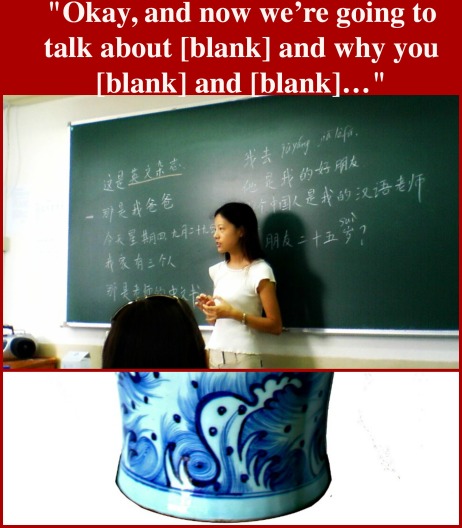
Attention displaced bookworms! Our book review columnist, Beth Green, an American expat in Prague (she is also an Adult Third Culture Kid), is back with a new recommended read!
Hello again Displaced Nationers!
After a long absence (in which I got to satisfy some wanderlust, go me!), I’m resuming my column just in time for the crisp autumn weather that is conducive to some serious reading.
This month I’m excited to tell you about one book in particular I uploaded to my Kindle since we last met: The Porcelain Thief: Searching the Middle Kingdom for Buried China—a memoir of a journey through Mainland China and Taiwan by Chinese American journalist Huan Hsu.

Photo credits: Top third of a Chinese antique porcelain vase (Pixabay); cover art; Huan Hsu’s author portrait, by Martijn van Nieuwenhuyzen.
Hsu currently lives in Amsterdam and teaches creative writing at Amsterdam University College, but he grew up in Utah. His parents had immigrated to the US from China via Taiwan. Hsu had never set foot in Asia until, as an adult, he started investigating the family legend that sparked this book.
I think one of the reasons Hsu’s account of his travels within China resonated with me so much is that I returned to the United States this summer after a two-year absence and, as usual, felt disoriented. In my case, of course, it was reverse culture shock. I just couldn’t get over the novelty of understanding everything. I started eavesdropping on conversations not because I wanted to but just because I could! Sometimes when people asked me questions, I would stare at them blankly before realizing I could understand what they were saying and respond. I found all the signs and labels, which I often tune out in my life in Prague, distracting. Man, counter culture shock can be tiring!
But whereas I was going home again, Hsu was recounting his very first journey to his homeland, another kind of (and more challenging, I think) Through-the-Looking-Glass experience.
Hsu goes to Shanghai ostensibly to work in an uncle’s semiconductor chip business, but really he wants to interview his grandmother to see what she knows about the family tale of his great-great grandfather having buried a vast collection of prized antique porcelain just before he and his family fled the town of Xingang, on the Yangtze River, to escape the Japanese occupation.
In a place he’s never been—but which many people expect him to regard as “home”
In Shanghai, Hsu finds himself in a place he’s never been—but which many people expect him to regard as “home.” Coming to China without fluent Mandarin, he’s just as much at-sea as many other American expats; but the people he encounters treat him differently than they do other foreigners. In fact, they don’t really consider him an “expat”; rather, they see him as “Chinese”—as much as he would have been if his family had never left that part of the world.
This honorary insider status frequently works to Hsu’s advantage as he tries to uncover the truth—if any is to be found—about the complicated events that led to his ancestor burying his precious porcelain pots before taking flight and becoming displaced.
To be honest, I would have been perfectly happy if Hsu’s entire book had been about his experiences as an American-born Chinese exploring China. As Hsu himself says in an essay published earlier this year just before The Porcelain Thief came out, “while books about the Chinese-American experience in America are plentiful, … the story of Chinese-Americans in China remains unstudied.”
It is a story that interests me personally as my now-husband, who is half Chinese, and I once lived in China, where he could pass for Chinese as long as he didn’t talk too much, whereas I was the visible foreigner. (Now that we live in Prague, our “visibilites” are reversed.)
Hsu talks about the times he had it easier adjusting to China because of his ancestry (fewer stares, more acceptance in some areas), but I was happy to see him also address the down side of this situation:
“…(F)etishization of Westerners was perhaps the most exasperating part of being an ABC [American-Born Chinese] in China…the Chinese still regarded laowai [foreigner] as an ethnicity, not a nationality, so we lacked the necessary skin tone and hair color.”
Likewise, other expats fail to see him:
“…I felt wounded when a fellow expat’s gaze passed over me without acknowledgment. Non-Chinese foreigners seemed to always notice one another on the street, sharing a knowing, conspiratorial glance, and when I tried to catch their eyes, they probably regarded me as just another impolite, ogling local. Though I stood out to the local Chinese, I was also invisible to many of my countrymen.”
Hsu’s refreshing honesty about the difficulties of living in China
One of the dangers of many travel memoirs (one that I sometimes fall prey to in my own writing) is to only write about the trip’s highlights. But perhaps because of his journalist background, Hsu is refreshingly honest. He calls it as he sees it:
“To face the absurdities of daily life, expats in Shanghai keep a mantra: This is China. The Middle Kingdom was not so much a foreign country as it was a parallel universe that managed to offend all five senses plus one more—common.”
Hmm… As I can attest from my own experience, it’s not only expats in Shanghai who feel that way!
And if he is honest about the difficulties of living in China, Hsu is also honest about the difficulties of studying Chinese. Anyone who has signed up for language classes after a move abroad will identify with this passage:
“Their Mandarin sounded familiar, and their speech didn’t seem fast to me, and sometimes I could even understand a good number of the words. But I couldn’t comprehend a thing because I was missing all the important ones, so I would hear something like, ‘Okay, and now we’re going to talk about [blank] and why you [blank] and [blank] because [blank] [blank] [blank] [blank] [blank] [blank] otherwise [blank] [blank] [blank]. Any questions?’”
Good memoirs are a little raw; this one is. Just as Hsu doesn’t pull any punches when describing China, he is equally blunt about owning up to his family’s quirks and talking about his own difficulties surmounting culture shock. Regarding this last, he writes about people having “the same personal space as puppies” on public transportation, and about his cringing embarrassment when he sees people drying their laundry on telephone poles in less-affluent areas of the city. I think anyone who has been an expat in China has made a similar list of initial observations. I can remember doing so after moving to China in 2006.
So much more than just a TCK-experiencing-Culture-One memoir
But in the end, the book is so much more than just a TCK-experiencing-Culture-One memoir. Tsu also introduces the reader to the art of Chinese porcelain, which serves in turn as a kind of symbol of modern China, a nation of fragments.

Photo credit: Chinese antique porcelain vase (Pixabay).
In fact the bulk of the book is devoted to Hsu actively searching for any remaining pieces of the family treasure. He flies to Taiwan and Hong Kong to locate the heart of the old porcelain industry. He finally visits the old family property that his great-greats had fled and in so doing turns up long-forgotten shirttail relations.
In the course of this quest, Hsu pieces together beautifully imagined scenes of his family’s escape from the Japanese into the Chinese diaspora.
I enjoyed The Porcelain Thief on all kinds of levels: as memoir, travelogue, art history, and social history. I’d particularly urge anyone who has lived as an expat in China, or who is thinking of doing so, to give it a try.
* * *
So, readers, have you ever had the experience of being an “invisible” expat or know someone who has felt that way? Let us know in the comments. And if you have ideas for books to review for this column, please leave a comment or let me know on Twitter! Last but not least, I urge you to sign up for the DISPLACED DISPATCH, which has at least one Recommended Read every week.
STAY TUNED for next week’s fab posts!
Beth Green is an American writer living in Prague, Czech Republic. She grew up on a sailboat and, though now a landlubber, continues to lead a peripatetic life, having lived in Asia as well as Europe. Her personal Web site is Beth Green Writes. She has also launched the site Everyday Travel Stories. To keep in touch with her in between columns, try following her on Facebook and Twitter. She’s a social media nut!
If you enjoyed this post, we invite you to subscribe to The Displaced Dispatch, a weekly round up of posts from The Displaced Nation and much, much more. Sign up for The Displaced Dispatch by clicking here!
Related posts:














Curiouser and curiouser. In the space of a week, we’ve been hearing about what it’s like to be an “invisible expat.” (See also HE Rybol’s interview with half-Chinese Cecilia Haynes.) Beth, just like you, I have been both. As a Caucasian with strawberry blonde hair, I was “invisible” in England (especially after my accent and vocabulary changed) and extremely visible (a red-haired devil!) in Japan. I actually found it easier when my status was out in the open than when it was hidden. When English people assumed I was one of them, they also assumed I shared their attitudes, which wasn’t always the case. But when I lived in Japan, I could simply say to myself: “I’m not Japanese so can’t be expected to share in this groupthink, thank goodness…” Do you know what I mean? How have you found it going from China to Czech Republic? Genuinely curious!!
Hi ML! I’m not sure if the Czechs expect me to share their attitudes, but they very often think I am Czech, especially because I habitually nod and smile a lot. 🙂 When I lived in China, it was always assumed I couldn’t speak for myself–even after I learned enough Mandarin to get by. Here, it is always assumed I can speak for myself–which is not quite true. Once I start speaking, I out myself as a foreigner but apparently not as an American. Strangely, in China people would guess I was Russian, while here I’ve heard plenty of different guesses, ranging from Ukrainian to British. And, in past visits to Australia one or two people have always asked if I’m Irish!